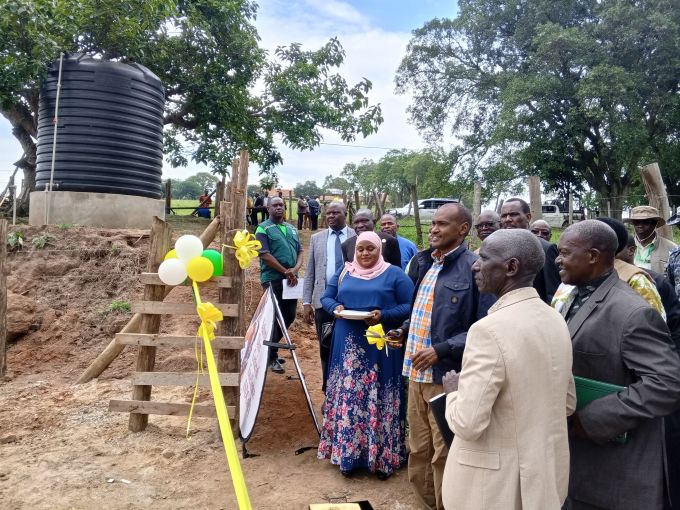MBARARA CITY, October 17, 2025 – Uganda’s first National Dairy Centre of Excellence [NDCE] has been launched at the Mbarara Zonal Agricultural Research and Development Institute [MbZARDI] by the National Agricultural Research Organisation [NARO].
The Centre established in Mbarara City aims to revolutionise the dairy sector through advanced breeding, resilient feeding systems, and farmer training.
The launch that took place on Tuesday was officiated by Agriculture Minister Frank Tumwebaze, alongside scientists and Members of Parliament.
A legacy of livestock innovation
Dr Yona Baguma, NARO’s Deputy Director General, noted that MbZARDI, originally established in 1926, has played a key role in advancing livestock farming in Uganda. He highlighted that 40 percent of Uganda’s milk comes from the Ankole region, thanks in large part to MbZARDI’s work.
However, many cows in the region still produce only 2–3 litres per day. The NDCE aims to boost this to 20–30 litres per cow, using improved genetics and semi-intensive systems. NARO is seeking Shs 50 billion over five years to support breeding, feed development, and nationwide farmer training.
“This centre must train and skill people to have real impact,” said Baguma, calling for government investment and private sector collaboration.
Minister urges policy, partnerships, and practical solutions
Minister Tumwebaze praised NARO’s research but stressed the need for market-driven innovations. He announced plans for a national breeding policy and stricter laws against fake animal breeds, calling such practices “criminal”.
He urged a focus on feed security, suggesting the development of “mother gardens” for key forage varieties like Pakchong and Brachiaria. He also encouraged the centre to become a one-stop hub, partnering with suppliers of dairy technology and inputs.
“If I come here, I should see everything, from breeds to coolers,” he said.
Tumwebaze advocated identifying and licensing high-performing private breeders to complement NDCE efforts and urged stronger farmer training in animal care and productivity.
He also promoted learning from Kenya’s dairy model, where cows can yield up to 40 litres daily, emphasising that management matters as much as breed quality.
“You can give someone a high-yield cow, but without proper care, it dies the next day,” he warned.
Boosting Innovation and Infrastructure
Mbarara’s Resident Commissioner, Catherine Hellen Kamwine, appealed for tractors and silage equipment to improve local feed production and affordability.
On the research front, Minister Tumwebaze confirmed that the anti-tick vaccine is near commercial rollout, with production equipment currently being installed.
He pledged continued support for breed importation, farmer access to improved animals, and annual farmer showcases.
Strategic dairy hub
Located in Uganda’s milk heartland, the NDCE will support the southwestern agricultural zone, home to major processors like Lato [Pearl Dairies], GBK Dairies, and Amos Dairies.
The centre’s mandate includes:
- Research and innovation to improve yields and milk quality
- Training and capacity building for farmers and extension workers
- Technology transfer to ensure uptake of innovations
- Value chain development, including product diversification and market access
NARO called for joint efforts across government, academia, private sector, and farmers to build a sustainable, competitive dairy sector that improves livelihoods and drives economic growth.
https://thecooperator.news/farmers-urged-to-embrace-dairy-farming-to-enhance-food-security/
Buy your copy of thecooperator magazine from one of our country-wide vending points or an e-copy on emag.thecooperator.news
